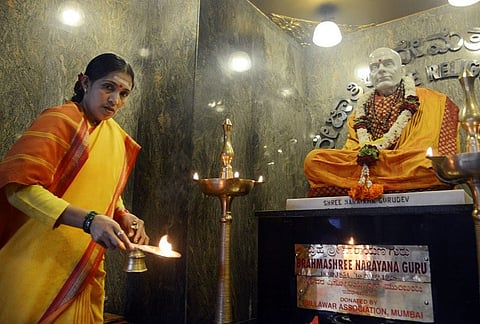

That Indira Shanti was performing a puja would not have been unusual were it not for the location. For the past two years, Indira and an elderly woman are a regular sight at the Gokarnatheshwara Temple in Mangaluru. Dressed in her yellow-and-red sari, she goes about the temple, performing puja to the deities including that of Sri Narayana Guru, the spiritual leader. More unusually, both women are widows, and they’ve been accepted by visitors to the temple.
A typical day for this 46-year-old woman starts at dawn, after which rituals such as the “Sandhya Vandane” are to be practiced before she goes to the temple. Priests are provided accommodation on the temple premises. After breakfast, Indira goes to the temple for the puja at 9 am and remains there throughout the day except when the temple closes.
Initially, there was some censure over her appointment. “Two years have passed. Things are fine now. But initially, it was difficult,” Indira smiles.
Indira’s husband Koragappa died five years ago of a heart attack. They had recently moved to Mangaluru for his work. “After his death, I didn’t step out of the house for some time. I had no courage to go up and about,” Indira recalls.
Her family owned some land in Mura village in Puttur taluk, about 40km away from Mangaluru. She looked after the orchard. Until her husband’s death, she had never had to work to earn money.

Losing her husband was bad enough, but becoming a “widow” added to her troubles. “When someone falls into these circumstances (widowhood), they are told that they have to live like widows. They’re told not to wear flowers in their hair, take off their kari mani (black beads signifying marriage), bangles and toe-rings. My elders too told me, so I abided by it for a while,” Indira says. In many communities, toe rings are a symbol of marriage for a woman.
“After your marriage, the kari mani is your security, it is the base of your life. Those who have gone through it (widowhood), wonder why life should be like this for them,” says Indira.
Around this time, a lawyer friend helped her find courage. He told her that she could not be dependent on her parents for a livelihood, and that she should stand on her own feet and support her children.
And she did stand on her feet.
At 40, Indira got her first job at a bakery. She continued to do jobs to support herself and her children for two years before she began to work at the temple.
In 2014, two years after her husband’s death, Congress leader and former union minister B Janardhan Poojary had widows appointed at the temple in a bid to break social taboos. Poojary, a Billava by caste, is closely associated with the temple which is (among others) dedicated to Sri Narayana Guru, who belonged to the Ezhava community and is known for his teachings on breaking caste barriers.
The Billava community (toddy tappers) in coastal Karnataka has been closely associated with the Narayana Guru movement. It is a different matter that the community leaders are criticized for straying from the anti-caste spiritual leader’s teachings. Poojary’s move to appoint women, that too widows, as priests is an application of Narayana Guru’s teachings
When an acquaintance suggested to Indira’s family, also Billava by caste, that she work at the temple, Indira agreed. She says, “I knew of Narayana Guru, but I learned more about him six months after I started working here. They took us to Sivagiri (Thiruvananthapuram district, Kerala, his resting place). That’s when I learned more about him. He taught that people should not discriminate.”
Life has settled into a routine for Indira now. Her daughter, who studies in Class 10, lives in a hostel in Vittal village, about 40km away. Her sons, studying in classes 8 and 4, live with her in Mangaluru. She earns about Rs 7,500 a month, and gets breaks during the day in between duties.
“Earlier when I worked elsewhere, you could go about and talk to people. Here, we do god’s work. It’s quite all right. Now I wear my kari mani and my silver toe-rings and about. I don’t like to show (that I am a widow),” she says.